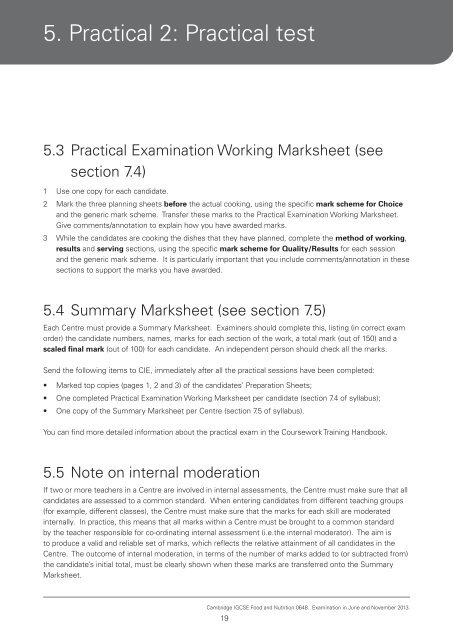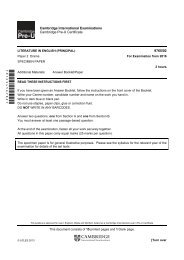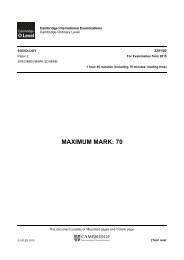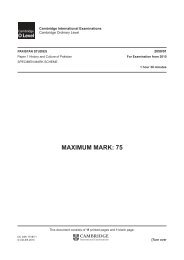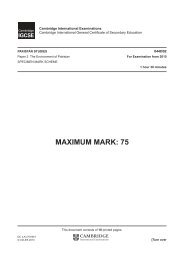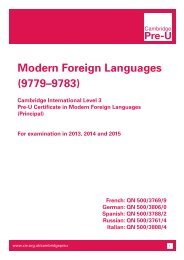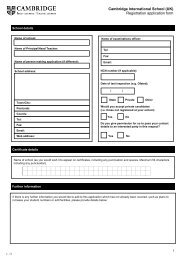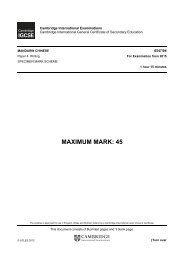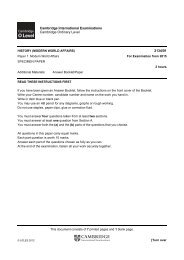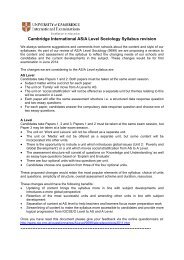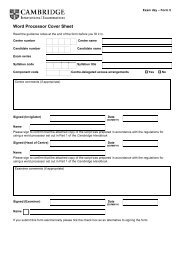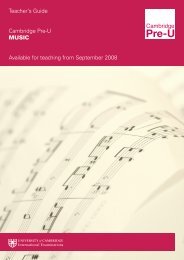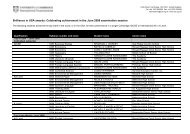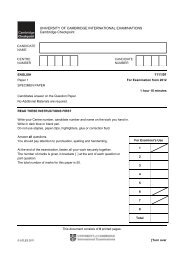2013 Syllabus - Cambridge International Examinations
2013 Syllabus - Cambridge International Examinations
2013 Syllabus - Cambridge International Examinations
You also want an ePaper? Increase the reach of your titles
YUMPU automatically turns print PDFs into web optimized ePapers that Google loves.
5. Practical 2: Practical test5.3 Practical Examination Working Marksheet (seesection 7.4)1 Use one copy for each candidate.2 Mark the three planning sheets before the actual cooking, using the specific mark scheme for Choiceand the generic mark scheme. Transfer these marks to the Practical Examination Working Marksheet.Give comments/annotation to explain how you have awarded marks.3 While the candidates are cooking the dishes that they have planned, complete the method of working,results and serving sections, using the specific mark scheme for Quality/Results for each sessionand the generic mark scheme. It is particularly important that you include comments/annotation in thesesections to support the marks you have awarded.5.4 Summary Marksheet (see section 7.5)Each Centre must provide a Summary Marksheet. Examiners should complete this, listing (in correct examorder) the candidate numbers, names, marks for each section of the work, a total mark (out of 150) and ascaled final mark (out of 100) for each candidate. An independent person should check all the marks.Send the following items to CIE, immediately after all the practical sessions have been completed:• Marked top copies (pages 1, 2 and 3) of the candidates’ Preparation Sheets;• One completed Practical Examination Working Marksheet per candidate (section 7.4 of syllabus);• One copy of the Summary Marksheet per Centre (section 7.5 of syllabus).You can find more detailed information about the practical exam in the Coursework Training Handbook.5.5 Note on internal moderationIf two or more teachers in a Centre are involved in internal assessments, the Centre must make sure that allcandidates are assessed to a common standard. When entering candidates from different teaching groups(for example, different classes), the Centre must make sure that the marks for each skill are moderatedinternally. In practice, this means that all marks within a Centre must be brought to a common standardby the teacher responsible for co-ordinating internal assessment (i.e.the internal moderator). The aim isto produce a valid and reliable set of marks, which reflects the relative attainment of all candidates in theCentre. The outcome of internal moderation, in terms of the number of marks added to (or subtracted from)the candidate’s initial total, must be clearly shown when these marks are transferred onto the SummaryMarksheet.<strong>Cambridge</strong> IGCSE Food and Nutrition 0648. Examination in June and November <strong>2013</strong>.19


